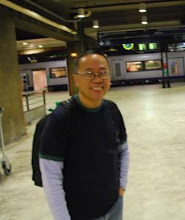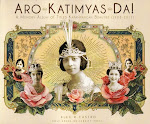 "ONE WHO CAN ALWAYS TELL WHEN PAYDAY IS COMING..". A Filipina stands ready to sell her charms to American military servicemen near Stotsenburg. Angeles. Ca. 1915.
"ONE WHO CAN ALWAYS TELL WHEN PAYDAY IS COMING..". A Filipina stands ready to sell her charms to American military servicemen near Stotsenburg. Angeles. Ca. 1915.For decades, especially in the 60s and 70s, Angeles was Pampanga’s “sin city”, a reputation bolstered by its honky-tonk atmosphere, its avenues lined with girlie bars and booze houses that catered to American servicemen stationed at Clark. En route to school from Mabalacat to Angeles, I would often pass through Balibago, lit with bright neon signs that spell come-on names like Cock and Bull, Pussy Galore, Thigh Hi alongside Las Vegas-inspired establishments like Copa Cabana, Stardust and Nina’s Papagayo.
Fields Avenue reflected a brasher, Wild, Wild West mood with its dizzying array of swanky bars, ‘dens of iniquities’, go-go-girls and ladies offering pleasures of the flesh to lonely American soldiers. Drunken brawls, crimes both violent and petty, conflicts between the military and civilians--not to mention the spread of venereal disease--were the inevitable consequences that are bound to happen in such volatile settings.
But scenarios like these already existed in the early days of Clark Field. American soldiers’ abuse of alcohol was already a constant problem then, and liquor-related deaths were regularly reported as in the case of Pvt. Henry T. Horton, who, in drunken stupor, fell asleep on the railroad track between Dau and the camp and was promptly ran over by a train. Alcohol also led to the violent end of Pvt. Arthur Breault who was beaten to death by 4 co-soldiers in 1911. Perhaps the worse tragedy was the deaths of four officers who met a vehicular accident on 23 January 1938, after their off-base drunken revelry. Only the driver survived.
It did not help that Filipinos also engaged in illegal liquor trade, causing strain between the base and the local government. In 1920, Lt. W.B. Ganther stormed into the office of acting governor Jose Narciso to demand the suspension of the Angeles police chief, who, he believed was involved in the illegal sale of wine. Narciso refused, and the next day, armed soldiers from Stotsenburg confronted him again. Only then did Narciso issue a suspension order, but he had the sense to report the matter all the way to Gov. Gen. Francis B. Harrison.
Another major problem that Stotsenburg officials had to contend with was the rise of sexually-transmitted diseases at the camp which became the leading cause of military inefficiency. An 1898 medical report took note that as American soldiers became “ habituated to the repulsiveness of native women, sexual immorality (became) more common”. By 1901, the report was more serious, with venereal disease spreading in other provinces “where the native women have been hitherto free from disease”.
Red-light districts were to be seen in Sapang Bato, known as “Sloppy Bottom” to soldiers, a place “full of sin and iniquity". Here, Filipino ‘baylarinas’ plied their services, although some Japanese women also worked the area. Barrio Margot, a recently-established barrio in the mid 1920s, provided an alterNAtive, what with its 300 residents, “composed mostly of women with questionable character”. Eventually, other areas of pleasure would sprout outside of Margot and all over Angeles—and pick-up places like “Bull Pen” were patronized by soldiers before the War, with girls to be had for 2 pesos per hour and 10 pesos for an all-night stand.
Much like Sodom and Gomorrha, the heady, decadent days of Angeles as a sin city came to a sudden end with the eruption of Mount Pinatubo, which caused the closure of Clark, and subsequently, the places of lusty pleasure along Jake Gonzales Blvd., Friendship Highway, Fields Avenue and Balibago. But such setback was only temporary. A quick survey of those places today reveal that only the habitués have changed—instead of Americans, a more international crowd animate the strip: German retirees, Aussies, Britons, Japanese and the ubiquitous Koreans.
Even business has expanded to include spas, massage parlors, gay bars, comedy and videoke clubs featuring strippers, masseuses, macho dancers, transvestite performers, hostos and GROs, sing-along masters and even oil wrestlers. Angeles may never be able to shake off its ‘sin city’ image, but for as long as cash registers are ringing, it does not really matter: happy days are here again.








No comments:
Post a Comment